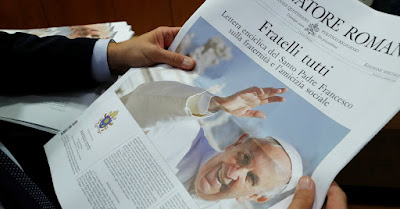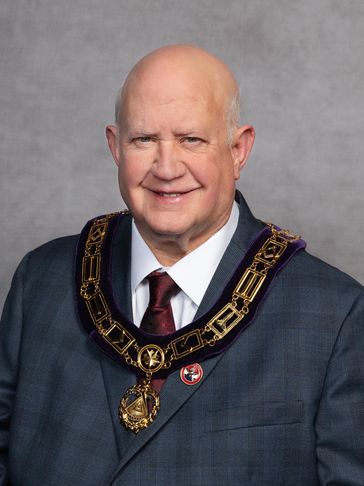The November 1983 declaration was published shortly before the new Code of Canon Law entered into force. The 1983 CIC replaced the Code of Canon Law published in 1917; among the new features noted – by some with satisfaction, by others with concern – was the absence of an explicit condemnation of Freemasonry and excommunication for those affiliated with it. Both had been present in the earlier Code. The Declaration, signed by the then-Cardinal Joseph Ratzinger and the Secretary of the Congregation, Archbishop Jérôme Hamer, and approved by John Paul II, reiterated that Catholics affiliated with Masonic lodges are “in a state of grave sin.”
“Membership in Freemasonry is very significant in the Philippines; it involves not only those who are formally enrolled in Masonic Lodges but, more generally, a large number of sympathizers and associates who are personally convinced that there is no opposition between membership in the Catholic Church and in Masonic Lodges . . . On the doctrinal level, it should be remembered that active membership in Freemasonry by a member of the faithful is forbidden because of the irreconcilability between Catholic doctrine and Freemasonry.”
That the famously liberal Pope Francis would now reaffirm his predecessor's opinion on Masonic membership some 40 years after Ratzinger's weighing in on the matter is an exceptionally disappointing blow to the hundreds of thousands of Catholic men around the world who are Masons and who don't regard the fraternity as irreconcilable with their faith in any way.
The Vatican II revisions of the 1960s stripped out the specific names of groups that had been ruled off limits in 1917, and just generically banned groups that actively were anti-Catholic. While French-derived "continental Freemasonry" really has espoused anti-Catholic sentiments and actively promoted "free will" and lobbied for strict secularism in France's national laws, such Masonic groups are shunned as "irregular" by English/Scottish-derived grand lodges that make up the vast majority of what is called "regular, recognized" Freemasonry all over the world today. In addition, the Scottish Rite "higher degrees" that first came out of France in the 1700s and were revised in the U.S. by Albert Pike in the late 1800s did contain a Knights Kadosh ritual that condemned both monarchial and papal "tyranny" which were seen as interfering with free will in men. Such a point of view hardly convinced the Church's authorities to ever look kindly on the fraternity.
A March 28, 2023 article on the Union of Catholic Asian News website reported on the Masonic questions coming out of the Philippines:
“We thought the Catholic Church’s teachings have changed. Since several participants in the synod were Freemasons, we thought the Church has relaxed the rules on its membership and its participation in activities of the Catholic Church,” Quezon City parishioner Gloria Buencamino, 43, told UCA News on March 26.Buencamino claimed some “extraordinary” ministers who helped the priest distribute communion during Mass in their parish were also Freemasons.“In our parish alone, we have two of them and they were delegates to the Synod on Synodality. They are good and pious Catholics. Personally, I was surprised to see the CBCP has released the pastoral guidelines,” Buencamino added.But the bishops’ commission clarified that “nothing has changed” and asserted that those joining Masonry will incur canonical penalties.“Yet, given the sensitivity and delicateness of the issue in the Philippine setting, it has also shown ‘openness,’ in the exercise of pastoral circumspection, towards Catholics who may have unwittingly in good faith sought membership in Masonic associations with the best of intentions,” said the commission chairman, Bishop Jose R. Rojas of Libmanan.
Paragraph #6. It is my desire that, in this our time, by acknowledging the dignity of each human person, we can contribute to the rebirth of a universal aspiration to fraternity. Fraternity between all men and women. “Here we have a splendid secret that shows us how to dream and to turn our life into a wonderful adventure. No one can face life in isolation… We need a community that supports and helps us, in which we can help one another to keep looking ahead. How important it is to dream together… By ourselves, we risk seeing mirages, things that are not there. Dreams, on the other hand, are built together”. Let us dream, then, as a single human family, as fellow travelers sharing the same flesh, as children of the same earth which is our common home, each of us bringing the richness of his or her beliefs and convictions, each of us with his or her own voice, brothers and sisters all.
Paragraph #8. “It is my desire that, in this our time, by acknowledging the dignity of each human person, we can contribute to the rebirth of a universal aspiration to fraternity.”
Paragraph #46. We should also recognize that destructive forms of fanaticism are at times found among religious believers, including Christians; they too “can be caught up in networks of verbal violence through the internet and the various forums of digital communication. Even in Catholic media, limits can be overstepped, defamation and slander can become commonplace, and all ethical standards and respect for the good name of others can be abandoned”. How can this contribute to the fraternity that our common Father asks of us?
Paragraph #95. “Love also impels us towards universal communion. No one can mature or find fulfillment by withdrawing from others. By its very nature, love calls for growth in openness and the ability to accept others as part of a continuing adventure that makes every periphery converge in a greater sense of mutual belonging. As Jesus told us: “You are all brothers” (Mt 23:8).
Paragraph #254. “I ask God to prepare our hearts to encounter our brothers and sisters, so that we may overcome our differences rooted in political thinking, language, culture and religion. Let us ask him to anoint our whole being with the balm of his mercy, which heals the injuries caused by mistakes, misunderstandings and disputes. And let us ask him for the grace to send us forth, in humility and meekness, seeking peace.”
Paragraph #272. “As believers, we are convinced that, without an openness to the Father of all, there will be no solid and stable reasons for an appeal to fraternity. We are certain that “only with this awareness that we are not orphans, but children, can we live in peace with one another”. For “reason, by itself, is capable of grasping the equality between men and of giving stability to their civic coexistence, but it cannot establish fraternity”.
Paragraph #277. “The Church esteems the ways in which God works in other religions, and “rejects nothing of what is true and holy in these religions. She has a high regard for their manner of life and conduct, their precepts and doctrines which… often reflect a ray of that truth which enlightens all men and women.”
Paragraph #281. “A journey of peace is possible between religions. Its point of departure must be God’s way of seeing things. God does not see with his eyes, God sees with his heart. And God’s love is the same for everyone, regardless of religion. Even if they are atheists, his love is the same. When the last day comes, and there is sufficient light to see things as they really are, we are going to find ourselves quite surprised.”
Paragraph #287. “He [Christ] wanted to be, in the end, “the universal brother” … May God inspire that dream in each one of us. Amen.”
To Catholic Freemasons around the world last year, such a proposed ecumenical assembly sounded mighty familiar, and many held out hope that this pontiff would finally drop restrictions on their already-existing "universal brotherhood." But obviously not. Of course, to the 'Militant Catholics' wing within the Church that has hated Francis from the day he was elected, last year's encyclical was clear proof to them that he's really a not-so-secret Jesuit Freemason anti-pope out to destroy the Vatican from within. Or something.








.png/:/rs=h:192,cg:true,m/qt=q:95)







